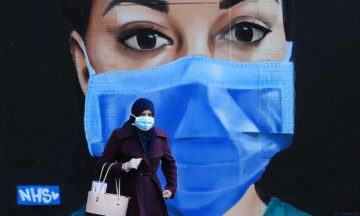Aarathi Prasad in The Guardian:
 It was May 2020, just months after Sars-CoV-2 began ripping through the world, when it emerged that 97% of the British medical staff who had died of the disease were from communities categorised as black, Asian and minority ethnic. News reports pronounced it extraordinary, shocking. Would that staple of press briefing catchphrases – “the virus does not discriminate” – require reconsideration? Could the reason minorities were suffering more be because of some sort of genetic difference? By September, it was announced that heightened genetic risk was not responsible for these groups being up to three times more likely to die from the virus. Instead, researchers laid the blame squarely on environmental factors and healthcare disparities.
It was May 2020, just months after Sars-CoV-2 began ripping through the world, when it emerged that 97% of the British medical staff who had died of the disease were from communities categorised as black, Asian and minority ethnic. News reports pronounced it extraordinary, shocking. Would that staple of press briefing catchphrases – “the virus does not discriminate” – require reconsideration? Could the reason minorities were suffering more be because of some sort of genetic difference? By September, it was announced that heightened genetic risk was not responsible for these groups being up to three times more likely to die from the virus. Instead, researchers laid the blame squarely on environmental factors and healthcare disparities.
Less than a year later, there were reports that uptake rates for the Covid vaccination were lowest among ethnic minorities. Sage, the Scientific Advisory Group for Emergencies, warned that this could form a significant risk to the vaccine drive. Low uptake was also found to be rooted in social and political factors, from long years of structural and institutional racism and discrimination, and their impact on those who remain among the most deprived in modern Britain.
Black, Pakistani, Bangladeshi people, whose very presence in Britain is inextricable from our colonial past, still live in the most deprived areas, in crowded housing, in places with the worst air pollution, subject to a range of toxic conditions that have huge impacts on health outcomes.
More here.
